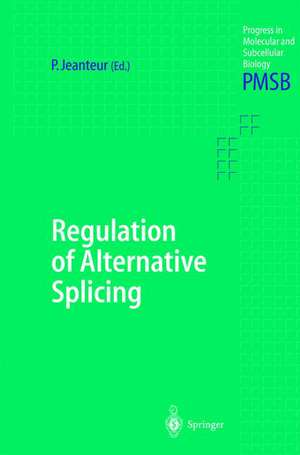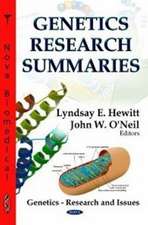Regulation of Alternative Splicing: Progress in Molecular and Subcellular Biology, cartea 31
Editat de Philippe Jeanteuren Limba Engleză Hardback – 21 oct 2002
| Toate formatele și edițiile | Preț | Express |
|---|---|---|
| Paperback (1) | 782.29 lei 38-44 zile | |
| Springer Berlin, Heidelberg – dec 2010 | 782.29 lei 38-44 zile | |
| Hardback (1) | 951.14 lei 6-8 săpt. | |
| Springer Berlin, Heidelberg – 21 oct 2002 | 951.14 lei 6-8 săpt. |
Din seria Progress in Molecular and Subcellular Biology
- 18%
 Preț: 1115.46 lei
Preț: 1115.46 lei - 18%
 Preț: 1403.04 lei
Preț: 1403.04 lei - 18%
 Preț: 1112.30 lei
Preț: 1112.30 lei - 18%
 Preț: 1117.03 lei
Preț: 1117.03 lei - 18%
 Preț: 1222.49 lei
Preț: 1222.49 lei - 18%
 Preț: 1382.21 lei
Preț: 1382.21 lei - 18%
 Preț: 1232.26 lei
Preț: 1232.26 lei - 18%
 Preț: 1222.80 lei
Preț: 1222.80 lei - 24%
 Preț: 1045.91 lei
Preț: 1045.91 lei - 18%
 Preț: 956.50 lei
Preț: 956.50 lei -
 Preț: 387.20 lei
Preț: 387.20 lei - 15%
 Preț: 639.73 lei
Preț: 639.73 lei - 15%
 Preț: 633.19 lei
Preț: 633.19 lei - 15%
 Preț: 634.18 lei
Preț: 634.18 lei - 15%
 Preț: 634.00 lei
Preț: 634.00 lei - 15%
 Preț: 640.24 lei
Preț: 640.24 lei - 5%
 Preț: 714.27 lei
Preț: 714.27 lei - 15%
 Preț: 634.32 lei
Preț: 634.32 lei - 15%
 Preț: 637.28 lei
Preț: 637.28 lei - 15%
 Preț: 637.78 lei
Preț: 637.78 lei - 15%
 Preț: 637.28 lei
Preț: 637.28 lei - 15%
 Preț: 649.06 lei
Preț: 649.06 lei -
 Preț: 387.75 lei
Preț: 387.75 lei - 18%
 Preț: 1220.75 lei
Preț: 1220.75 lei - 18%
 Preț: 1224.99 lei
Preț: 1224.99 lei - 18%
 Preț: 946.87 lei
Preț: 946.87 lei - 15%
 Preț: 633.35 lei
Preț: 633.35 lei - 18%
 Preț: 944.36 lei
Preț: 944.36 lei -
 Preț: 387.96 lei
Preț: 387.96 lei - 15%
 Preț: 633.02 lei
Preț: 633.02 lei - 15%
 Preț: 640.88 lei
Preț: 640.88 lei - 5%
 Preț: 720.10 lei
Preț: 720.10 lei
Preț: 951.14 lei
Preț vechi: 1159.94 lei
-18% Nou
Puncte Express: 1427
Preț estimativ în valută:
182.02€ • 186.41$ • 151.41£
182.02€ • 186.41$ • 151.41£
Carte tipărită la comandă
Livrare economică 18 martie-01 aprilie
Preluare comenzi: 021 569.72.76
Specificații
ISBN-13: 9783540438335
ISBN-10: 3540438335
Pagini: 258
Ilustrații: XIII, 245 p. 78 illus., 1 illus. in color.
Dimensiuni: 155 x 235 x 19 mm
Greutate: 0.61 kg
Ediția:2003
Editura: Springer Berlin, Heidelberg
Colecția Springer
Seria Progress in Molecular and Subcellular Biology
Locul publicării:Berlin, Heidelberg, Germany
ISBN-10: 3540438335
Pagini: 258
Ilustrații: XIII, 245 p. 78 illus., 1 illus. in color.
Dimensiuni: 155 x 235 x 19 mm
Greutate: 0.61 kg
Ediția:2003
Editura: Springer Berlin, Heidelberg
Colecția Springer
Seria Progress in Molecular and Subcellular Biology
Locul publicării:Berlin, Heidelberg, Germany
Public țintă
ResearchCuprins
Prediction and Statistical Analysis of Alternatively Spliced Exons.- Multiple Roles of the SR Protein Family in Splicing Regulation.- Heterogeneous Nuclear Ribonucleoprotein Particle A/B Proteins and the Control of Alternative Splicing of the Mammalian Heterogeneous Nuclear Ribonucleoprotein Particle A1 Pre-mRNA.- Phosphorylation-Dependent Control of the Pre-mRNA Splicing Machinery.- Splicing Regulation in Drosophila Sex Determination.- Alternative Pre-mRNA Splicing and Regulation of Programmed Cell Death.- Alternative Pre-mRNA Splicing and Neuronal Function.- Modulation of Alternative Splicing by Antisense Oligonucleotides.
Textul de pe ultima copertă
The generality and quantitative extent of alternative splicing have only now begun to be fully appreciated. The first draft of the complete human genome led to the surprisingly low figure of about 32,000 genes. The extensive use of alternative splicing and its consequences in terms of coding capacity could account for this discrepancy and help fill the complexity gap between the genome and the proteome. After a computer-based assessment of the frequency of alternative splicing, this book addresses mechanistic aspects followed by examples of its involvement in important cellular processes. Finally, it raises the possibility of artificial modulation of alternative splicing by antisense nucleotides.
Caracteristici
Excellent overview of alternative splicing Incorporates newly emerging technologies and research directions Includes supplementary material: sn.pub/extras













